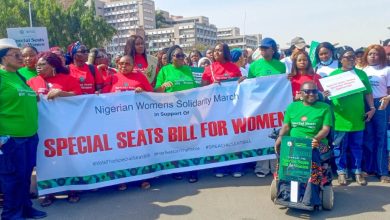
Imagine being told: “You’re excluded, but don’t worry, we’ve carved out a special side seat for you. No competition. No credibility. Just accept it quietly.” That’s what this so-called “reserved seats” bill feels like.
Yes, Nigeria has a shameful record on women’s political representation, 4% in the Senate, bottom-tier globally. Yes, something has to change. But this bill is not that change. It’s not empowerment. It’s insulation. A padded room where women can sit without disrupting the system that locked them out in the first place.
And yet, many are cheering it on as progress; let’s slow down. Reserved seats don’t break the system, they protect it.
What this bill does is add 74 new federal seats and 108 at the state level, exclusively for women, without requiring parties to actually run women in the real electoral trenches. It’s a legislative side hustle, a visibility stunt with no structural teeth.
Here’s what happens next:
Women get labelled as quota beneficiaries, not political players.
Party leaders hand out the seats as rewards to loyalists, wives, daughters, and protégés.
Real grassroots female contenders are sidelined again, only this time, in the name of “inclusion.”
We’ve seen this before. In local government appointments. In token cabinet roles. In “gender balance,” PR moves that amount to one photo op and zero policy impact. Why repeat it at a national scale?
This bill doesn’t democratise access. It institutionalises inequality, now in two tracks: the chosen and the curated.
If we’re serious, we change the rules, not just the optics. Power isn’t gifted. It’s built through rules, systems, and access. And right now, those systems are rigged.
Here’s what reform that actually empowers women would look like:
Mandatory party quotas in real elections. Not reserved seats, reserved candidacies. If your party doesn’t run at least 35% women in competitive districts, you’re fined or disqualified. Simple.
Public campaign funding for women. Cover INEC fees. Subsidize airtime. Match private donations. Level the cash battlefield.
Zero tolerance for political violence. Fast-track prosecution for harassment, intimidation, or threats against female candidates, online or offline.
Invest in a pipeline. Build a leadership bench starting at the local level: counsellors, aides, committee leaders. Not everyone starts with a senator’s surname.
Reward performance, not presence. Offer real incentives, extra media time, policy grants, or budgetary leverage to parties that don’t just parade women, but elect and elevate them.
This is how we fix the playing field without breaking the scoreboard.
Young Women: Don’t Let Them Sell You Soft Power
If you’re a young woman watching this unfold, don’t be seduced by numbers. Demand power with weight. Visibility without influence is just decoration.
Women’s groups. feminist organisers. Keep the pressure on, just retarget it. Aim less at inflating headcounts and more at prying open the machinery: primaries, financing, safety, party bylaws. Numbers without leverage are décor.
And insiders, you know the choreography: stitched primaries, brokered delegates, loyalty IOUs traded at 2 a.m. If equity is more than a press release, prove it. Publish your candidate gender data in winnable seats. Unseal primary rules early. Back an enforcement unit on political harassment. Open the system, don’t stage a quota side-show while the real deals stay in the dark.
Influence or it’s empty
Reserved seats aren’t radical. They’re risk management. A way for the system to say, “Look, we’ve made space for you,” without ever giving up control.
But we don’t want space. We want seats with levers. Seats with budgets. Seats with consequences.
The goal isn’t more women in politics. It’s more women in charge.
Augusta Yaakugh-Shahin is a feminist lawyer, UK-chartered arbitrator, and the Executive Director of the Lex Initiative for Rights, Advocacy, and Development. She works at the intersection of gender justice, legal reform, and civic accountability. With a sharp understanding on how power shapes law, climate policy, and public life, Augusta is known for championing inclusive systems that centre the voices of women.
Editor’s Note: For submission of feminist articles or literary works, send stories to naijafeminists@gmail.com.






